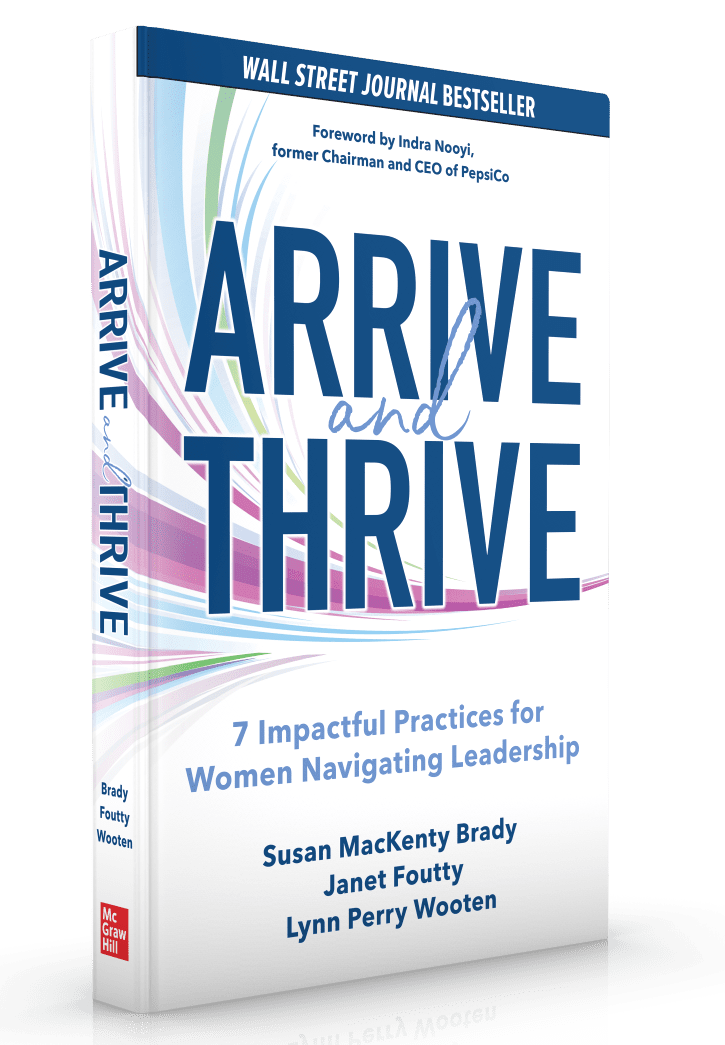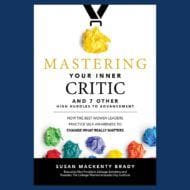Research & Insights
Breaking Free from Self-Doubt: How to Reconnect with Your Best Self

In our work with leaders in our communities both here on campus and in organizations around the world, sometimes it’s the simple conversations that remind us about the everyday impact of our inner narrative on our own well-being and on those around us. When Susan and I started drafting this blog together, she shared that she had a recent conversation with an executive who confessed to her that “he wished a couple of women on his team weren’t so insecure.”
She winced. Her heart sank.
Seriously? Insecure, she thought?
We don’t want this brand for anyone – never mind any bright, capable women. Important to note: This is an executive who has a strong track record of recruiting, hiring, partnering with, supporting, advocating for, and creating incredible opportunities for many women over the course of his career.
Susan leaned in, curious. He elaborated, “They need a lot of reassurance.” She could tell that this “reassurance” he spoke of called for more than the occasional “you got this.” It meant more work – a lot more work – for him. On top of presiding over his functions, dealing with big egos among his executive team peers, and mentoring and coaching not just his direct reports but also leaders throughout the organization, he also needs to serve as a one-man “believe-in-yourself-cheerleading squad” to the “insecure” women he hired and promoted? While Susan felt empathy for him, she also felt compassion for the women who were showing up as insecure.
The Rise of Imposter Syndrome
Projecting a lack of confidence may indicate a deeper dilemma of not feeling good enough, which is the breeding ground for Imposter Syndrome (the repeated thought that you are not as talented or worthy as others believe, and fear that one day people will realize that.)
We know women get a bad rap for being confident and invulnerable – and an equally bad rap for being overly needy of reassurance. That is, if women even feel safe enough to ask for reassurance. Behind the veneer of competent perfection that many women feel compelled to display, is a human being who doesn’t want to disappoint. The behaviors that all too often go hand-in-hand with feelings of being an Imposter aren’t exactly what we would call “Best Self” attributes.
 In our book Arrive and Thrive: 7 Impactful Practices for Women Navigating Leadership, we tackle this head-on, starting with Practice #1, Investing in Your Best Self. We define the Best Self Zone as leading and living your life from the optimum part of you. This focuses on exploring what your strengths and talents are, understanding where you add value to others, what brings you joy and vitality, and identifying the self-care actions you need to take to truly thrive.
In our book Arrive and Thrive: 7 Impactful Practices for Women Navigating Leadership, we tackle this head-on, starting with Practice #1, Investing in Your Best Self. We define the Best Self Zone as leading and living your life from the optimum part of you. This focuses on exploring what your strengths and talents are, understanding where you add value to others, what brings you joy and vitality, and identifying the self-care actions you need to take to truly thrive.
Women who struggle with feelings of professional insecurity often cite feeling not enough, ashamed they aren’t better at their job, worried about doing it all well, feeling stressed out and on edge, and ultimately exhausted from doing too much themselves. It’s also a losing situation for those around them, who often describe them as perfectionistic, controlling, unable to delegate, overly detail-oriented, stifling, and too anxious or intense.
Could some or all of this suboptimal behavior also come from feeling utter annoyance with the lackluster performance of those around us? Sure. And often, the same woman who may present as insecure in one context may feel utterly annoyed at the incompetence she is surrounded by in another context. Neither set of circumstances is a recipe for leading from your Best Self.
Confidence or Worthiness: So What?
When Susan further probed this executive to describe what he meant by “insecure”, he replied: “repeated failure to live up to their full potential of confidence.” She thought: “Hmmm. Why might these women be unable to live up to their ‘full potential of confidence?’”
 In her 2018 book Mastering Your Inner Critic and Other High Hurdles to Advancement, How the Best Women Leaders Practice Self Awareness to Change What Really Matters, she tackles confidence head on by making the distinction between worthiness and confidence. Worthiness is a belief (I AM enough, of value, etc..) and as such, one doesn’t grow worthiness. Rather, one returns to one’s belief in their own worthiness, something that we can practice when life tends to tell us how we aren’t quite enough in subtle and not-so-subtle ways.
In her 2018 book Mastering Your Inner Critic and Other High Hurdles to Advancement, How the Best Women Leaders Practice Self Awareness to Change What Really Matters, she tackles confidence head on by making the distinction between worthiness and confidence. Worthiness is a belief (I AM enough, of value, etc..) and as such, one doesn’t grow worthiness. Rather, one returns to one’s belief in their own worthiness, something that we can practice when life tends to tell us how we aren’t quite enough in subtle and not-so-subtle ways.
Confidence in specific areas, however, does need to be built. In everything from riding a bicycle to speaking a language – we get better as we practice and as such, learn and grow into our confidence. It is no different with a new job assignment or a bigger suite of job responsibilities. Confidence in your judgment will come mostly from on-the-job learning. This is where having not just one but multiple mentor relationships can be super helpful. If we could talk to this executive’s direct reports, we would want to better understand what support they are getting from people other than their (very busy) boss.
How else can we realize our full potential of self-confidence while we learn and grow on the job? How can we kick that inner Imposter who wants us to believe at any moment we will be called out as clearly out of our league and unworthy of the job at hand? Our freedom from the nasty Imposter comes from knowing who we are at our worthy, Best Self. Think of your Best Self as the inner liner to the winter coat of confidence. When we deeply understand and lean into our strengths and feel worthy – and enough inside, we can learn and grow – and take risks and not get it right all the time. This also liberates others to do the same.
How to Return to Your Best Self – And Kick That Imposter Out The Door
You can prosecute a task, project, job, or assignment you have never done with confidence. The key is knowing how to return to your Best Self repeatedly as you do it. Otherwise, you are at risk of being overtaken by feelings of insecurity that eke out in ways that damage your credibility (or simply exhaust your boss.)
The Best Self Centering Practice (also known as the “Best Self Return”) is a way to manage the guilt or fear we shoulder of not living up to whatever all-consuming self-expectations we have. The goal of returning to your best self is to realize and operate from a place where you honor yourself for your unique strengths and remember you are enough, whole, worthy and complete. It’s a return to respect for self (and respect for others.) It must be intentional, and consciously practiced.
Four Tips to Take Down Your Inner Imposter and Return to Your Best Self:
- Notice. It starts with noticing what you are thinking and how you are feeling. What is your internal narrative? Catch that person while she’s talking in your head – and before you ask your boss to reassure you. This is a moment-to-moment practice, and one that takes intention.
- Breathe. This is easier said than done. Still, it is one of the most important things you can learn to do. Breathing actually counters the stress response. By taking a deep breath, you can slow things down. You can create new challenges (internally and with others) when you simply react.
- Engage Your Inner Coach. Picture your inner coach sitting on your shoulder. She is kind and loving and gentle and empathetic. She is curious and thoughtful. She can help you reframe the situation to change the narrative. Her role as a coach is to help you do two things – get compassionate, or in other words, honor yourself and others as whole and worthy human beings, and get curious about what’s going on. Your best self-attributes bring you back to a place of self-compassion.
- Take Action. This is the destination – mindfully choosing how we show up as our Best Self. Your best doesn’t think she’s better than others – and yet – she sure knows what her strengths are and how she is of value to the organization.
Thriving Beats Feeling Insecure – You aren’t here by mistake.
You aren’t in your current role by accident. You might be experiencing a learning curve, you might be new in the role, you may find yourself in a situation you have not experienced before, or you might see that the job requires strengths you haven’t used in a while, or even ones you have that don’t fuel you.
None of this adds up to being fraudulent, or where you are by mistake. Even if – in the end – you find you aren’t the right fit for the job you are in, you have unique, important value to bring. You are worthy. You are enough. You matter. Now, it’s your turn to build the muscle of returning to your Best Self like your career depends on it. You get to thrive while you repeatedly arrive in positions of greater responsibility. Your boss, colleagues, team, (and the people you live with) will undoubtedly benefit as you keep this important idea top of mind in all that you do.





